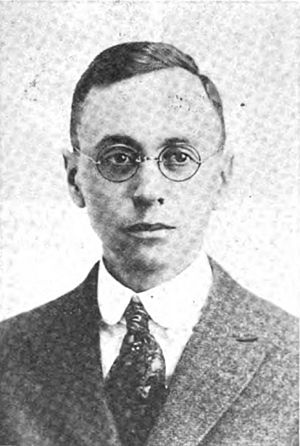Arthur M. Schlesinger Sr. facts for kids
Quick facts for kids
Arthur M. Schlesinger
|
|
|---|---|
 |
|
| Born |
Arthur Meier Schlesinger
February 27, 1888 Xenia, Ohio, U.S.
|
| Died | October 30, 1965 (aged 77) Boston, Massachusetts, U.S.
|
| Alma mater | Ohio State University Columbia University |
| Occupation | Historian |
| Children | Arthur Jr. |
| Parents |
|
Arthur Meier Schlesinger Sr. (born February 27, 1888 – died October 30, 1965) was an American historian. He taught at Harvard University for many years. He was known for starting new ways of studying history, like focusing on "social history" and "urban history."
Schlesinger believed that economic reasons and conflicts between different groups of people were very important in shaping history. He helped many students earn their advanced degrees (Ph.D.s) at Harvard. His son, Arthur M. Schlesinger Jr., also became a well-known historian.
Contents
Life and Education
Arthur Schlesinger Sr.'s father, Bernhard, was from Prussia (now part of Germany). His mother, Kate, was from Austria. They both moved to Xenia, Ohio, in 1872.
Arthur was born in Xenia, Ohio. He graduated from Ohio State University in 1910. He then earned his advanced degree (Ph.D.) in history from Columbia University.
He taught history at Ohio State and the University of Iowa. In 1924, he became a history professor at Harvard University. He taught there until 1954. The Schlesinger Library at Harvard, which focuses on women's history, is named after him and his wife, Elizabeth Bancroft Schlesinger. She was also a well-known feminist.
Arthur Schlesinger Sr. came from a close-knit family. His two older sisters became teachers. They helped their three younger brothers, including Arthur, go to college. Arthur Schlesinger Sr. passed away in Boston, Massachusetts.
His Big Ideas About History
Arthur Schlesinger Sr. was a pioneer in two new fields of history:
- Social history: This looks at the lives of everyday people, not just leaders or big events.
- Urban history: This focuses on how cities grew and changed, and how they affected people's lives.
He believed that economic reasons, like wanting to make money, were big motivators for people in history. He didn't think that ideas or values were as important. For three decades, he guided many students at Harvard who were studying social history, women's history, and immigration history. In 1922, he noted that history textbooks often made it seem like half the population didn't contribute much to history.
To promote social history, he helped edit a 13-volume book series called History of American Life (1928–1943). These books focused on topics like society, population changes, economics, housing, fashion, sports, education, and culture. They mostly avoided politics or famous individuals.
How He Saw American Politics
In 1939, Schlesinger wrote an essay called "Tides of American Politics." In it, he shared his idea that American history has a repeating pattern. He thought there were regular shifts between times when the country felt more liberal (wanting change) and times when it felt more conservative (wanting to keep things as they are).
He also came up with the idea of asking historians to rank how great U.S. presidents were. This idea became very popular.
Schlesinger also studied the "Jacksonian democratic movement" from the 1800s. He pointed out that while democracy was growing in the western parts of the U.S., people in eastern cities were also fighting for equality and better living conditions. He believed that to truly understand this movement, you had to look at how life changed for ordinary people in the new industrial cities of the East. This was a different idea from his Harvard colleague Frederick Jackson Turner, who focused more on the importance of the American frontier.
Schlesinger also said that prejudice against Catholics was "the deepest bias in the history of the American people."
He and his students often studied history by looking at groups of people, rather than just individuals. These groups could be based on their background (like Germans or Irish) or their social class (like the working class). They believed that the city environment, and how different groups interacted, strongly shaped their history and views.
Important Books and Writings
- 1918 The Colonial Merchants and the American Revolution, 1763–1776
- 1922 New Viewpoints in American History, essays on how history is studied
- 1925 Political and Social Growth of the American People, 1865–1940, a college textbook
- 1926 Political and Social History of the United States, 1829–1925
- 1930 "A Critical Period in American Religion, 1875–1900"
- 1933 The Rise of the City, 1878–1898
- 1940 "The City in American History"
- 1941 "Patriotism Names the Baby"
- 1944 "Biography of a Nation of Joiners"
- 1946 Learning How to Behave: A Historical Study of American Etiquette Books
- 1949 Paths to the Present
- 1958 Prelude to Independence: The Newspaper War on Britain, 1764–1776
- 1950 The American As Reformer.
- 1954 "A Note on Songs as Patriot Propaganda 1765–1776"
- 1955 "Political Mobs and the American Revolution, 1765–1776"
- 1963 In Retrospect: The History of a Historian, his autobiography
- 1968 Birth of the Nation: A Portrait of the American People on the Eve of Independence
See also
 In Spanish: Arthur M. Schlesinger Sr. para niños
In Spanish: Arthur M. Schlesinger Sr. para niños
 | Tommie Smith |
 | Simone Manuel |
 | Shani Davis |
 | Simone Biles |
 | Alice Coachman |

